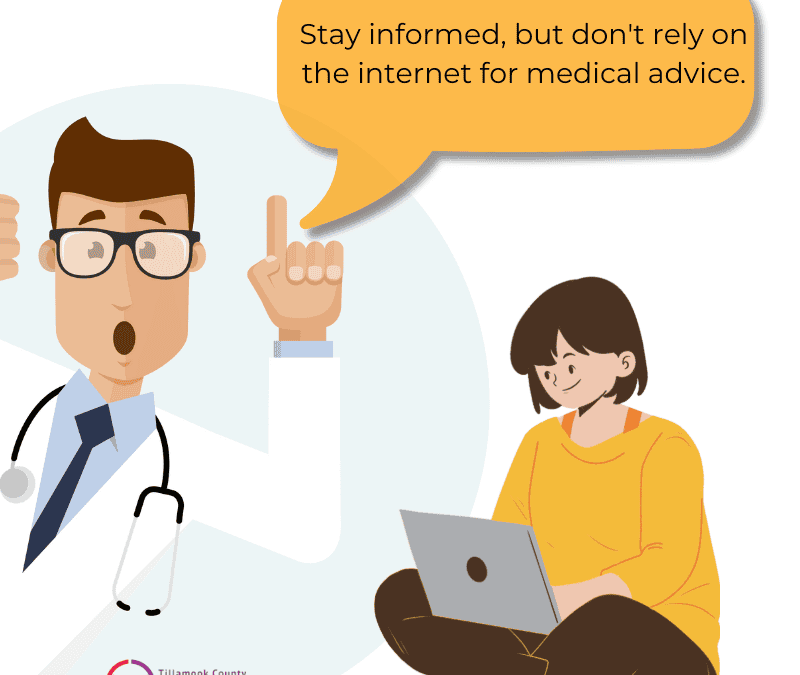Fortunately, Buzzfeed has never claimed to be able to give you any medical diagnosis. But plenty of other sources on the internet walk the fine line between “this is not medical advice” and “this sure sounds a lot like medical advice”. There’s a quiz for everything, and a “cure” for everything. A problem you didn’t know you had, and the product that can solve it (for three easy payments of $19.95, plus shipping and handling!) Anything and everything to do with your health can be found with a few taps on your phone, so it’s important to recognize how media literacy ties in with health literacy.
Let’s take a step back. About 21% of US adults experience chronic pain, or pain that lasts for three or more months. Millions suffer from conditions that have no known treatment or cure. Our doctors don’t always have the answers we are looking for. After all, they can’t prescribe a treatment that doesn’t exist, or diagnose a condition that they don’t have the evidence for. And so, we strike out on our own determined to find a solution to the pain we carry every day. A solution beyond the scientific boundaries of conventional medical practice. Collectively, these solutions are referred to as alternative medicine.
Alternative medicine has real value to many individuals and cultures. That is not up for debate. For thousands of years, alternative medicine was the only medicine. However, there is potential for significant harm as these practices have expanded from healers utilizing medicinal herbs to Dr. Charlatan on the internet trying to sell you an at-home detox regimen that may very well do more harm than good. Many treatments or devices label themselves as alternative medicine when they are little more than a scam.
Here, health literacy and media literacy collide. Having the ability to recognize what information and products are legitimate and which are deceptive (not to mention potentially harmful and a waste of money) can make a significant difference in your health and quality of life. Let’s go over some questions to ask as you evaluate the validity of medical information online:
- Does it come from a reputable webpage, such as that of a university or hospital
system? Keep in mind that anyone can post deceiving information on social
media, or even on a website of their own. The website URL can give you some
clues. Websites ending in .edu=educational institutions, .gov=government agencies, .org =an organization (often non-profit), .com=commercial, and.net=network. Be particularly wary of .com and .net websites, as they could be hosted by anyone. - Does it conflict with other reputable sources? If so, consider getting a second (or
third) opinion. - Does the source profit off of your choice? Are they trying to sell you anything (a
device, a course, a supplement)? If they are promoting a supplement, is it their
own brand that they are trying to sell? - Is it sensational? Black and white? Health information should be educational, not
headline-grabbing or clickbait. - Do they have credible sources/citations?
- Is the person or organization making statements credentialed to do so? (Some
titles sound legitimate, but require no training or certification. For example,
anyone can claim to be a “nutritionist”, but “registered dietician” is a protected
title for trained professionals.)
To encourage a safe health practices, consider these tips:
- Avoid long gaps in medical care. Establish with a primary care provider (PCP)
and maintain regular visits. Let them know if anything changes with your health. - Avoid self-diagnosing. Seek the most accurate diagnosis possible from a trained
physician. - If you choose to take any supplements, ask your doctor if there is any risk that
they will interfere with your prescription medications. Remember that
supplements are not regulated by the Food and Drug Administration and
sometimes do not contain the product or dosage reflected on the label. - Don’t change or stop any prescribed medications without consulting your doctor.
- Evaluate how much you are spending on alternative treatments, and whether you
are getting the positive outcomes you are looking for.
What medical treatments or information you choose to follow is ultimately your decision. If alternative medicine provides you with healing and comfort, that’s fantastic! But if you have any questions or concerns about your health, always go to a physician first. Keep up with Tillamook County Wellness’ health literacy campaign to continue learning about how you can play an active role in managing your health. And in the meantime, stick to the TikToks that teach you about gardening, not self-medicating. Be well, Tillamook!
For more about health literacy, go to https://tillamookcountywellness.org/be-well/connect-well-blog.
Resources:
Rikard SM, Strahan AE, Schmit KM, Guy GP Jr.. Chronic Pain Among Adults — United States, 2019–2021. MMWR Morb Mortal Wkly Rep 2023;72:379–385. DOI: http://dx.doi.org/10.15585/mmwr.mm7215a1.
U.S. Department of Health and Human Services. (2024, February 13). Is this legit? accessing valid and reliable health information. National Institutes of Health.
https://nida.nih.gov/research-topics/parents-educators/lesson-plans/legit-accessing-valid-and-reliable-health-information


.png)